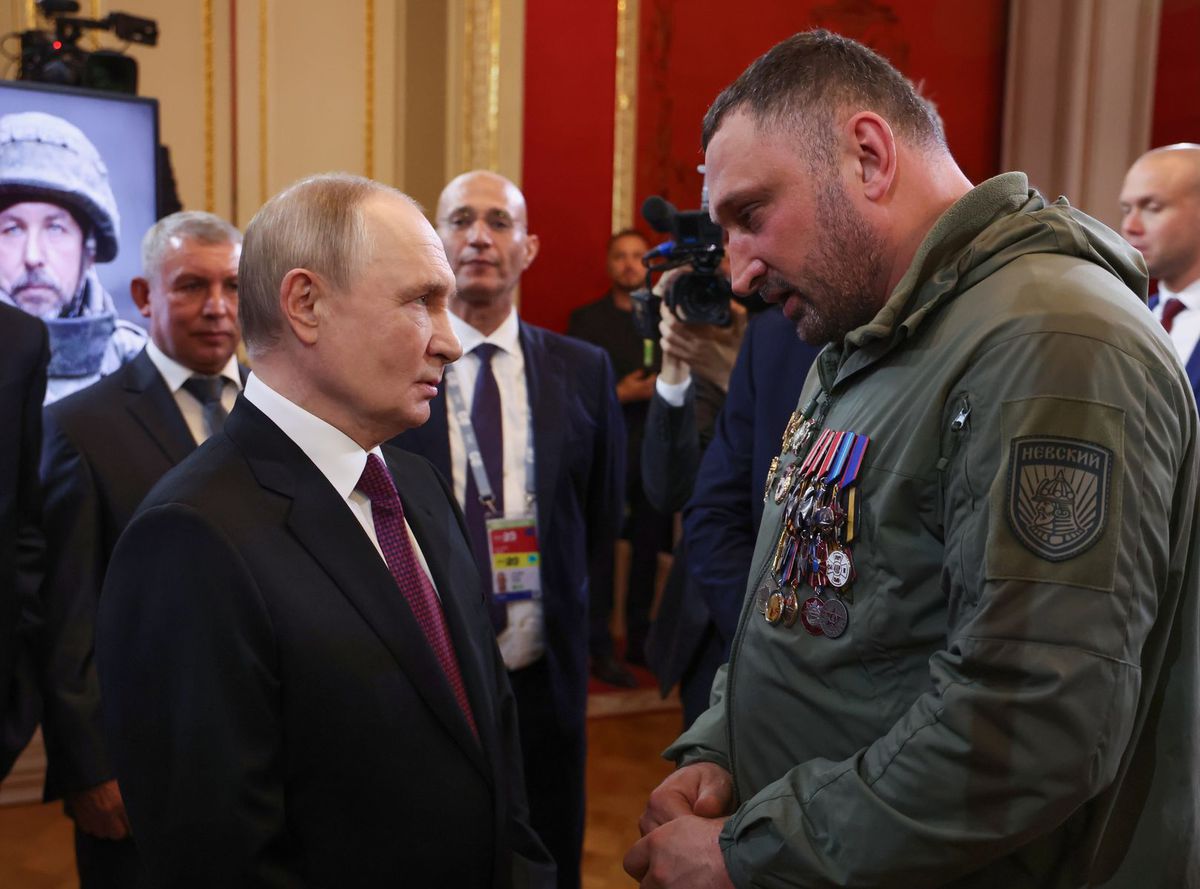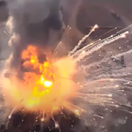Wars end when ammunition, soldiers and money run out. Hamas has learned this. Putin is getting close to learning it too, wrote the British newspaper The Telegraph.

18:40 Finnish President Alexander Stubb said that his American counterpart Donald Trump is"the only one who can force" Russian leader Vladimir Putin to negotiate peace in Ukraine."We don't need so much the power of sugar to convince Russia to negotiate, but rather a whip," Stubb said in an interview with the BBC. This is noted by the Ukrainian Pravda daily.
According to the Finnish president, Trump has already given Russia sugar."The sugar was in Alaska," he noted. However, the Finnish leader said he was optimistic about Trump's abilities.
The Finnish president believes that economic pressure should be used to bring Russia to the negotiating table. Stubb added that the Russian economy is struggling, with depleted reserves, almost zero growth and inflation at 10 to 20 percent.
17:10 More than 25,000 soldiers and officers of the Russian Central Military District deserted in the nine months from November last year to July this year. As reported by the website Ukrainska Pravda, Ukrainian military intelligence reported this.
Some soldiers abandon their positions directly on the front line, others disappear from their permanent posts or do not return from leave or medical care.
According to Ukrainian military intelligence, the main reasons are unbearable service conditions, bullying, lack of supplies, and mass deployment into so-called"meat grinders."
According to Ukrainian intelligence, internal Russian military reports also mention cases of deaths due to"failure to follow orders," suggesting the shooting of soldiers who refuse to carry out suicide attacks.
17:05 According to Reuters, Russia reports two dead civilians from the occupied part of the Kherson region.
Russia said two civilians were killed in a Ukrainian drone strike in the Russian-occupied Kherson region. The Moscow-installed head of the occupied part of the region, Vladimir Saldo, said on his Telegram channel, adding that the victims were living in a temporary accommodation center for evacuees.
17:00 Repair work on damaged power lines at Ukraine's Zaporizhzhia nuclear power plant has begun after a four-week outage, the International Atomic Energy Agency (IAEA) said on Saturday. The ongoing repairs have also been confirmed by the Russian and Ukrainian sides.
Repairs to the power line began after"the establishment of local ceasefire zones to allow work to continue," IAEA Director General Rafael Grossi said on Platform X.
"Restoring external power is crucial for nuclear safety and security. Both parties have worked constructively with the IAEA to enable the continuation of the comprehensive repair plan," Grossi added.
The agency did not say how long the work would take, but Grossi said on Wednesday that repairs were needed on both sides of the front line, several kilometers from the plant site.
The Zaporizhzhia nuclear power plant, which has been occupied by Russian forces since March 2022, lost its connection to the grid on September 23 for the tenth time since the start of the Russian invasion. The current outage is the longest since the outbreak of the war. Although the plant's reactors have been shut down for more than three years, the facility still needs a reliable external power source to cool its nuclear fuel and maintain safety systems.
Since the outage, the plant has been dependent on backup diesel generators. According to the IAEA, safety has been maintained so far - all six shut-down reactors are effectively cooled and radiation levels remain within the norm.
Europe's largest nuclear power plant has been repeatedly targeted by attacks and sabotage since the start of the Russian invasion, with both sides of the conflict blaming each other for the incidents.
16:50 The Austrian Foreign Ministry announced on Saturday that it will finally support the latest 19th package of European sanctions against Russia at the upcoming summit. According to information from the Euronews portal, Austria and Slovakia blocked the package on Wednesday at the level of permanent representatives of the member states.
13:00 The city of Budapest has been chosen as the venue for the upcoming bilateral summit between US President Donald Trump and Russian President Vladimir Putin for a simple reason – Hungary is the only country in Europe that is walking the path of peace. Hungarian Prime Minister Viktor Orbán said this on Saturday via Facebook.
11:00 US President Donald Trump informed his Ukrainian counterpart Volodymyr Zelensky at a meeting in Washington on Friday that he has no intention of providing Ukraine with long-range Tomahawk missiles yet, as he considers diplomacy a priority. As reported by the Ukrainian Truth website, sources from the Axios and CNN portals stated.
10:55 Ukrainian air defenses intercepted 136 Russian drones out of 164 launched into Ukraine during the night. The Ukrainska Pravda server reported this today, citing the Ukrainian Air Force. The nighttime Russian attack targeted the north, south, east and center of the country. Russia also attacked the Poltava region in the morning, whose governor said that the attack did not cause any casualties. The Kyiv Independent server wrote that Ukrainian drones attacked an electrical substation in the Russian Ulyanovsk region at night.
An electrical substation in the village of Veshkayma in Russia's Ulyanovsk region was engulfed in flames after a nighttime attack by Ukrainian drones, Russian channels on the Telegram network reported. The substation of the same name is owned by Russia's largest electricity company, Rosseti.
Ukraine has stepped up long-range attacks on Russian oil, gas and energy infrastructure, a key source of revenue for Moscow and one that is helping to finance its invasion of Ukraine. The Veshkaima substation is located more than 900 kilometers east of the Russian-Ukrainian border.
Russian Telegram accounts also reported an explosion at an explosives factory on Friday evening in the Russian city of Sterlitamak in the Urals, which killed three women and injured five others. The head of the autonomous republic of Bashkortostan, Radiy Khabirov, said on Telegram that it was not a drone attack but an explosion, which is now being analyzed by forensic experts. One building of the factory nearby was destroyed.
9:00 Ukrainian President Volodymyr Zelenskyy described his Friday meeting with his American counterpart Donald Trump as productive. They discussed, among other things, air defense and security guarantees for Kiev. However, according to Reuters, the Ukrainian president did not want to comment specifically on the issue of American supplies of long-range Tomahawk missiles, but said that he was a realist. After the meeting, Trump wrote on his social network that the meeting was interesting and warm and that it was time to end the war and make a deal.
8:00 An explosion occurred at one of the Avangard weapons and ammunition plant's workplaces in the city of Sterlitamak in the Russian Republic of Bashkortostan, injuring eight people, while five people were trapped in the rubble, TASS reports.

7:25 The British newspaper The Telegraph analyzed the situation with the war in Ukraine. "Donald Trump is on the rise. He is not only making history in the Middle East, but also in Eastern Europe. By finally standing up to the declining Russian regime, Trump has opened the way to something that few expected weeks ago: a quicker end to Putin's disastrous war. If he were successful again, it would be very difficult for the Norwegians to deny Trump the Nobel Peace Prize next year. As a happy side effect, he may even, believe it or not, help the Russians get rid of the last European despot of the 19th century," writes Mark Brolin in the British newspaper The Telegraph.
“We’re wiping them out.” SBU special forces strike with uncompromising precision
Trump’s turnaround has two parts. First, he made it clear that Europe must stop burdening American taxpayers for free and take basic responsibility for its own security. This was long overdue. For a generation, European governments have preferred disarmament theater and moral pomp, exaggerating Moscow’s power to keep America’s checks flowing even as European energy firms continued to buy Russian oil. Trump was mocked for saying this during his first term, insisting that NATO members meet their spending commitments. No one is laughing now, The Telegraph recalls.
Second, Trump has finally shed the Cold War notion that Russia is so formidable that if we want to avoid World War III, we must accept that it can pressure its neighbors into being its vassals. Russia is a weak, fragile power in rapid decline, whose sphere of influence has been shrinking steadily for decades. The invasion of Ukraine was supposed to halt that decline; it accelerated it. The territory seized at enormous cost is far from compensating for the collapse of Russian influence in Central Asia, the Middle East, and the rest of Europe.
The key moment came in late September, when Trump publicly accepted the suggestion that Ukraine could reclaim all of its territory. This was not just rhetorical flourish; it marked a clear break with the “both sides must surrender” nonsense that undermined the heroic Ukrainian struggle and flattered the Kremlin’s mythology. The US president’s words matter. Treat Russia as strong and the parties involved are wary. Treat it as fragile and the initiative is released, The Telegraph reports.
The US support, according to The Telegraph, has pushed the situation to enable long-range attacks that degrade the Russian war machine. The Tomahawk threat goes even further. “That is not to deny the risk. Moscow always warns of a ‘dramatic escalation’ when taboos against hitting targets in Russia are broken. But whining is not strength. Russia has been forced to reroute fuel flows, import goods it once exported, and swallow disruptions to refineries that threaten combat capabilities. With the Tomahawks in the discussion, the more serious risk of escalation has finally found itself where it belongs: against Russia, not Ukraine. The Kremlin’s bluff is exposed. The sound is not a bear’s roar, but a carding sound – and, predictably, a nervous rustling in the corridors of Russian power,” the Telegraph reports.
“For years, it was believed that Russia was so powerful that only the US could contain it. The truer line is the opposite: Russia is so systemically weak that moral clarity, targeted pressure and support for Ukraine’s asymmetric strengths can affect both the battlefield and Moscow’s policy. Ironically, Washington has sobered up faster than Europe,” wrote Mark Brolin in The Telegraph.
"Wars never end with flawless stories. They end when the ammunition, soldiers and money run out. Hamas has learned this. Putin is getting closer to learning this too," he added.

